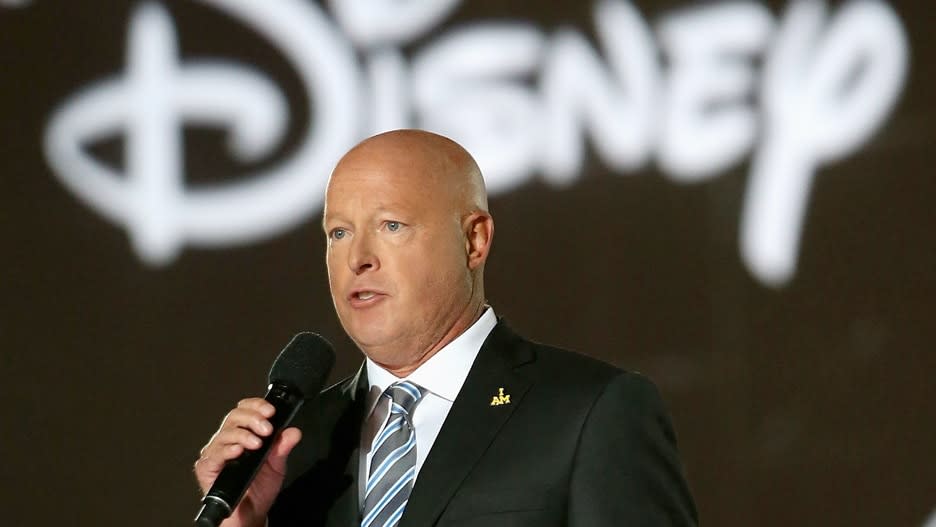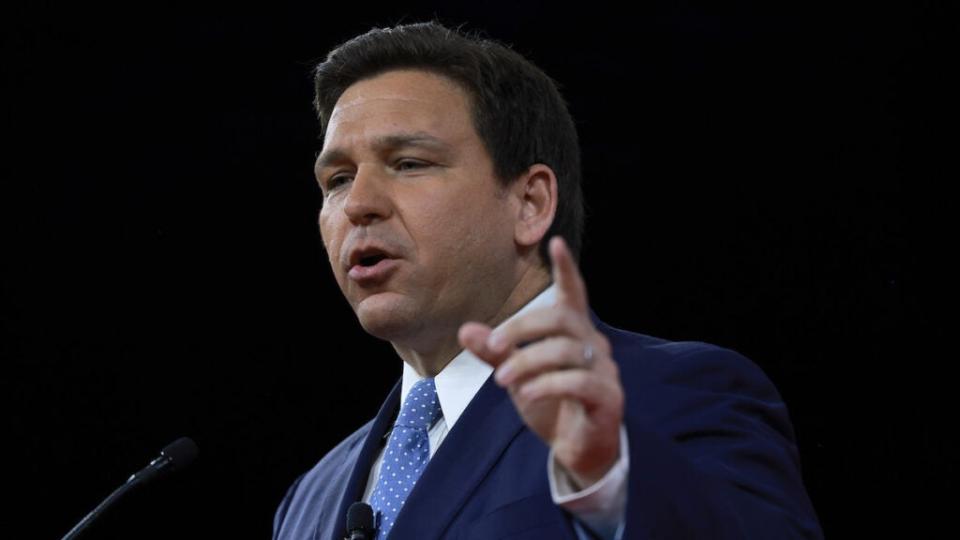LGBTQ Groups Outraged That Disney Denounced Georgia’s 2016 Anti-Gay Law But Not Florida’s New ‘Don’t Say Gay’ Bill
As the Florida state Senate on Thursday passed a “Don’t Say Gay” bill that would ban “classroom discussion about sexual orientation or gender identity” in primary schools, LGBTQ groups expressed outrage that Disney, one of the state’s biggest employers, has not voiced its opposition to the legislation.
In fact, Disney CEO Bob Chapek defended the company’s silence in an internal memo to staff on Monday and argued that corporate statements on political issues like the “Don’t Say Gay” bill can be “weaponized” and are often “counterproductive.”
Jean-Marie Navetta, director of Learning and Inclusion for PFLAG National, told TheWrap that Chapek’s memo represented a “complete turnaround from the way Disney has behaved in the past” on such issues.
In 2016, under previous CEO Bob Iger, Disney pressured then-Georgia Governor Nathan Deal to reject a bill that would have allowed faith-based organizations to refuse services to LGBTQ+ individuals that might violate their religious beliefs. The studio threatened to “take our business elsewhere” and refuse to continue filming in the state — where it had shot multiple Marvel blockbusters in Atlanta-area soundstages. Deal, a Republican, ultimately vetoed the law despite its passage in both chambers of the state legislature.
The contrast in Disney’s leadership is striking for many, especially in the LGBTQ community. “It’s really disappointing to see the new leader of the organization claiming these policy statements aren’t effective and that they can be weaponized when in fact he’s completely missing the point,” Navetta said.
“These statements are powerful. They do have a proven track record of steering the way things are going to happen,” she added. And if we want to talk about what’s being weaponized, let’s talk about weaponizing the Florida state legislature to come after LGBTQ youth.”
Chapek’s reluctance to denounce the bill — and the disclosure that Disney has made campaign contributions to some of the Florida bill’s sponsors and co-sponsors — has sparked protests outside Orlando’s Disney World parks and statements from LGBTQ+ employees with the hashtag #DisneySayGay.

Chapek, who in 2017 donated $500 to a PAC for then-House Majority Leader Kevin McCarthy (R-Calif.), had clarified in his memo that he does not want anyone to “mistake a lack of a statement for a lack of support” and reiterated that Disney supports LGBTQ+ employees and the community. He also said that the company has not given political contributions based on this issue and will be reassessing advocacy strategies going forward.
But Chapek also argued that the content Disney produces makes a greater statement about inclusion than a corporate message about a specific piece of legislation, suggesting that the ability to tell such stories “would be diminished if our company were to become a political football in any debate.”
Navetta, however, rejected Chapek’s argument. “He seems to be think it’s an either/or,” she said. “That either you issue a statement or you produce great content, and it seems to miss the point that Disney has been able to do both in the past.”
The Georgia legislation, she added, came at a time when Disney was already beginning to reassess its content to become more progressive and inclusive, but she said the company at that time did far more than just produce great content and demonstrated “great corporate citizenship.”
“People started to listen,” she said. “It was proved positive that these policy statements actually do work and they do have influence. And it’s just denying reality for Bob Chapek to say that it’s not the case and that’s not real.”
Brandon Wolf, a press secretary for Equality Florida (and a former Disney cast member at the Magic Kingdom), noted that Disney especially has outsize influence in Florida politics, pointing to Disney’s large lobbying apparatus in the Florida government as a way in which it could “flex its muscles” if it wanted to push back on the “Don’t Say Gay” bill. He noted that Disney was able to gain an exemption from a recent (now blocked) bill passed that would’ve restricted social media companies in Florida from de-platforming political candidates.
Other activist groups and individuals have urged corporations to speak out and use their influence. Abigail Disney, who is not affiliated with the Walt Disney Company but is Roy Disney’s granddaughter and has been critical of Disney’s salary gap for its cast members in Disneyland, reacted to Chapek’s memo by saying that “times for neutrality are long since over.”
“What is Disney for? Is it for pretending what America is about, or it is for defining a vision for a world in which fantasy, love, kindness, decency and loyalty are bedrock values,” she tweeted. “Nothing about the ‘don’t say gay’ bill or about Chapek’s memo is consistent with any of these values. Many LGBTQI people and their allies work for or look to Disney for ally-ship. But Chapek is more worried about right-wing backlash than about his own loyal fans and employees.”
GLAAD’s president and CEO Sarah Kate Ellis also called on businesses and brands to speak out, noting that many who engage with consumers during Pride month can’t suddenly “stay silent as anti-LGBTQ youth are targeted by legislation.”
“Companies that do business in Florida, Texas, and the dozens of other states considering anti-LGBTQ legislation not only have a responsibility to speak out for their LGBTQ customers and employees, they also have a real opportunity to educate the public about these unpopular and harmful bills and stop them from becoming law,” Ellis said in a statement to TheWrap.
“Real action from businesses helped repeal North Carolina’s anti-transgender HB2, which restricted access to public restrooms in 2017, and helped combat Indiana’s notorious anti-LGBTQ bill in 2015,” she said. “Companies should listen to their own employees, and to their consumers, and speak out loudly about how bills like these conflict with corporate values embracing inclusion and diversity.”
“Companies should be speaking out loudly against anti-LGBTQ legislation, both publicly and privately. Standing up for LGBTQ+ employees and customers isn’t just the right thing to do, it’s also effective,” Jay Brown, Human Rights Campaign SVP for Programs, Research & Training, told TheWrap. “It reminds lawmakers that real people are impacted by these bills — people who they were elected to serve, and who fuel their local economies. And it also reminds elected leaders that LGBTQ+ people are not alone in our opposition, that we are part of a much larger community including some of the most prominent, influential brands they see every day in their own homes and communities.”
Navetta said she finds Disney’s stance under Chapek to be paradoxical. “There are corporations that have put themselves out there as concerned about building inclusion, making sure everyone is seen, making sure everyone is treated fairly, as Disney very much has,” she said. “It’s very difficult when we see that same organization step away from places where they can have influence while at the same profiting pretty nicely off the LGTBQ community.”
A representative for Disney did not respond for request for comment on this story.

The “Don’t Say Gay” bill, officially called the Parental Rights in Education bill, is designed to prohibit Florida schools from teaching students between kindergarten and third grade about topics of sexual orientation or gender identity. After passing the Florida Senate on Tuesday, governor Ron DeSantis has previously indicated that he intends to sign the bill into law.
While Republicans and DeSantis have defended the bill saying that it only bans “planned lessons” on sexuality, critics have said the bill is designed to stifle conversations about LGBTQ+ youth. Many Disney employees too have taken to social media to express their concern, saying that they would not be who they are today should a law like this go into effect.
Dana Terrace, the creator of “The Owl House,” said in a viral video that she had a hard time coming to terms with her queerness “because of stuff like this, because I thought I shouldn’t exist, because no one told me I had the option of existing.”
And Benjamin Siemon, an animation TV writer on shows like “Duck Tales,” said that he would’ve been “left alone and scared” had the “Don’t Say Gay” bill passed when he was a kid in school.
“LGBTQ kids are going to be left alone and scared and hurt by this bill. Teachers that are gay and married to partners won’t even be able to talk about them. They’re going to have to pretend that gay people don’t exist,” he said in a video. “When [Disney] have donated to sponsors and co-sponsors of the ‘Don’t Say Gay’ bill and have made no position against this bill and are going to continue donating to these politicians, they are essentially saying that this bill is okay.”

 generic
generic 